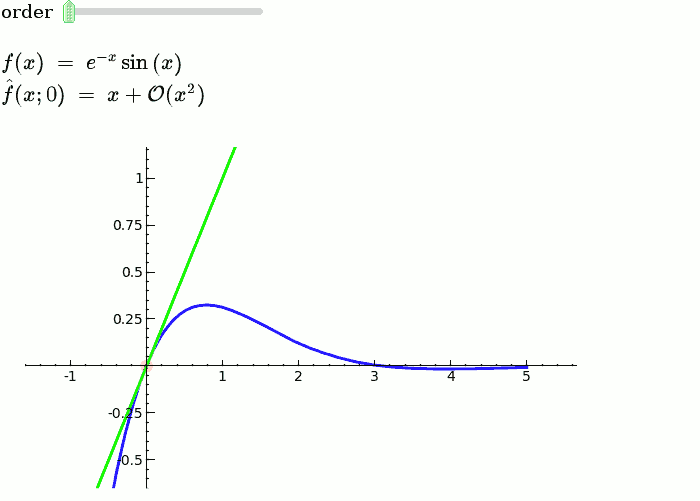|
Size: 1755
Comment: Testing built-in Python source parser.
|
Size: 1765
Comment: Can anyone make a less ugly fix? Adding 'y0' avoids use of deprecated feature that allowed function-call syntax and unnamed arguments in point(). Everything downstream should work.
|
| Deletions are marked like this. | Additions are marked like this. |
| Line 28: | Line 28: |
| y0 = f(x0) | |
| Line 29: | Line 30: |
| dot = point((x0,f(x0)),pointsize=80,rgbcolor=(1,0,0)) | dot = point((x0,y0),pointsize=80,rgbcolor=(1,0,0)) |
Sage Interactions
This is a collection of pages demonstrating the use of the interact command in Sage. It should be easy to just scroll through and copy/paste examples into sage notebooks. If you have suggestions on how to improve interact, add them here or email [email protected] . Of course, your own examples are also welcome!
Explanatory example: Taylor Series
This is the code and a mockup animation of the interact command. It defines a slider, seen on top, that can be dragged. Once dragged, it changes the value of the variable "order" and the whole block of code gets evaluated. This principle can be seen in various examples presented on the pages above!
var('x')
x0 = 0
f = sin(x)*e^(-x)
y0 = f(x0)
p = plot(f,-1,5, thickness=2)
dot = point((x0,y0),pointsize=80,rgbcolor=(1,0,0))
@interact
def _(order=(1..12)):
ft = f.taylor(x,x0,order)
pt = plot(ft,-1, 5, color='green', thickness=2)
html('$f(x)\;=\;%s$'%latex(f))
html('$\hat{f}(x;%s)\;=\;%s+\mathcal{O}(x^{%s})$'%(x0,latex(ft),order+1))
show(dot + p + pt, ymin = -.5, ymax = 1)

